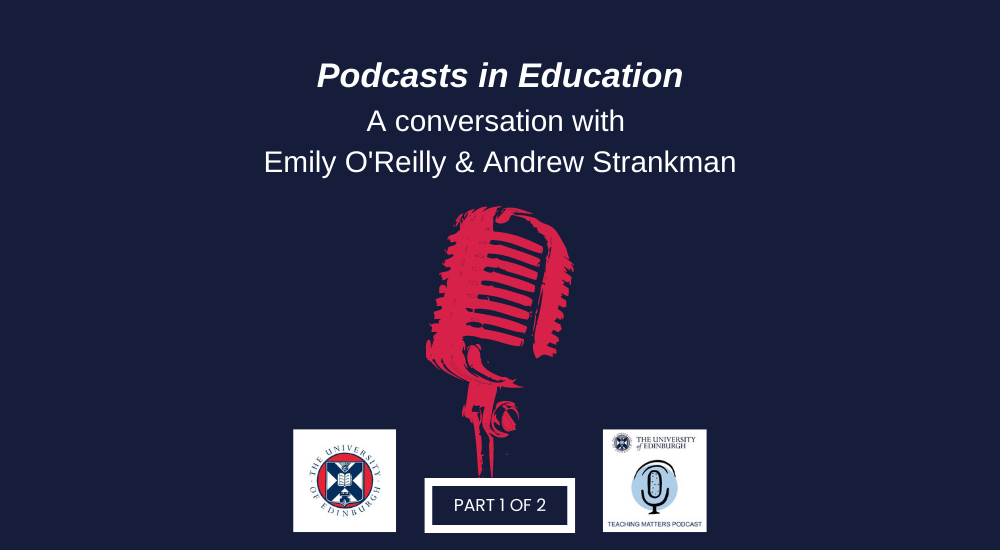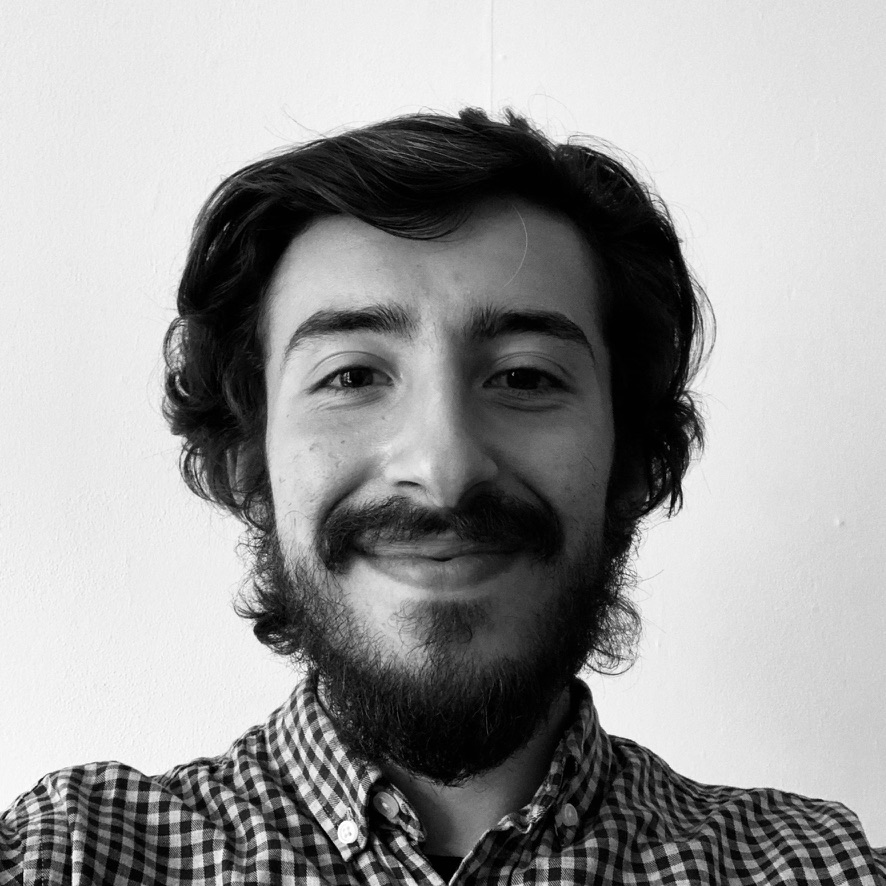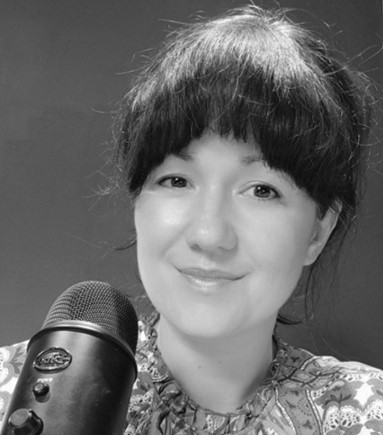
In this episode, Dr Emily O’Reilly and alumnus Andrew Strankman from the School of Biomedical Sciences discuss their fantastic research project on podcasting in education, funded by the Principal’s Teaching Awards Scheme. This is the first in a two-part conversation facilitated by Teaching Matters’ Eric Berger, which allows Emily and Andrew to reflect on the ‘whys, whats, and hows’ of educational podcasting.
This episode, Part 1, takes us into the specifics of Emily and Andrew’s fascinating project, which surveyed a diverse cohort of students enrolled onto two online MSc programmes. Taking us through the project’s origins, methods, results, their discussion attends to how podcasting can revitalise how we exchange knowledge in the classroom, both online and otherwise.
At the heart of Emily and Andrew’s project, we find, are a number of research questions about the relationships between podcasting and pedagogy. What do students think about podcasts? What role might podcasting play in the delivery of learning materials — and what role do they actively play in teaching today? What are the kinds of podcasts that we currently have on offer? And most importantly, what do podcasts have to offer us? In chasing these questions, Emily and Andrew are engaged in the evergreen issue of student engagement, particularly in online education where virtual fatigue and silent drop-outs can be high.
To that end, Emily believes that “bite-sized” bits of teaching is the path forward, both for students and instructors:
… I think one of the biggest issues with online learning is attrition rates. And you can really improve that if you have students that are engaged, that are listening to you, that see you as a person, you know. Online discussion boards are great, forums are great to engage with people, but having people like listen to you, and, you know, sharing sort of what’s going on in the world is great… There has been studies that have been done on [podcasts] in terms of welcoming students to an area… And because they’re easier to produce, and edit, and record and upload, that can be done by educators quite readily on a weekly basis, it’s really not that difficult.
As their research results attest, this interactivity and connectivity – even a sense of camaraderie – promised by podcasting is what makes the form so compelling to students. Andrew concurs:
… I could go to the store and buy a textbook, and I’m sure it’d be great fun to read several 100 pages of textbook – and that’s sarcasm there. That’s not true. But I think it’s great to be able to provide multimedia tools to allow students to hear you and to see you, especially in the lens of an educator, right? Your goal is to share your knowledge and what [sparked] your passion to those students to make them interested in material.
In this fantastic conversation, energised by moderator Eric’s own experiences as a student and podcast enthusiast, Emily and Andrew illuminate the many opportunities offered by the podcast to students from across time zones, cultures, and ages. Their discussion confirms how these possibilities can concretely help increase not only educational quality, but also, as Emily puts it, “educational equality”.
Transcript of the episode is available here.
2:00 – Emily and Andrew introduce themselves and their interest in podcasting, particularly in what the podcast form offers their students
14:41 – Our speakers expand on the particulars of their PTAS project, focusing on the kinds of students they interviewed and the feedback received
27:00 – The two consider what the ‘best’ educational podcasts tend to sound like
34:35 – Emily and Andrew reflect on podcasts from their perspectives as course organiser and instructor, respectively, mid and post-pandemic
41:30 – Emily, Andrew, and Eric discuss how podcasts can shake up traditional classroom dynamics between teacher and learner
Emily O’Reilly
Dr Emily O’Reilly is lecturer within the Deanery of Biomedical Sciences at The University of Edinburgh. Emily teaches on the Global Health & Infectious Disease programme and is deputy director for the International Animal Health online M.Sc. programme. She contributes to the undergraduate global health and infectious disease course and has supervised over 30 MSc student projects to date. Emily qualified as a veterinarian from the University of Glasgow in 2008 and returned after two years in general practice to complete a PhD in broiler chicken immunity. She continued this research as a postdoctoral researcher and also undertook postdoctoral research in dairy mastitis and AMR. She has been with The University of Edinburgh since 2016 becoming a FHEA in 2020. She teaches on a range of areas including immunology, diagnostics, vaccinology, and food security. In her spare-time, she enjoys gardening and walking her border collie!
Andrew Strankman
Andrew Strankman is an alumnus of the MSc Global Health and Infectious Diseases programme at The University of Edinburgh. His master’s dissertation work focused on the usage of supplementary podcasts in medically relevant educational courses combined his backgrounds as a microbiologist and an educator. Andrew works as a Biology Lecturer in the United States where he continues to conduct investigation into science and medical education.
Series produced and edited by:
 ERIC BERGER
ERIC BERGER
Eric is an alumnus of The University of Edinburgh, where he studied Mathematics and Statistics student and worked as a podcasting intern for Teaching Matters. Eric is passionate about university student mental health, interviewing researchers for the Student Mental Health Research Network at King’s College London, leading the University of Edinburgh’s WellComm Kings Peer Support Scheme, and conducting research on stigma for People With Mental Illnesses (PWMI). In his free time, he enjoys watching and playing sports, over-analysing hip-hop songs, podcasts, and any sort of wholesome shenanigans.
Aiswarya Jayamohan
Aiswarya Jayamohan is a PhD researcher in English literature at The University of Edinburgh, specialising in twentieth century writing, critical theory, and gender & sexuality studies. Their growing interest in critical pedagogy emerges from the trans* feminist priorities of their research and teaching, and ongoing engagements with curriculum transformation at the Institute for Academic Development. You can find them on Twitter at @ajayamoh.




